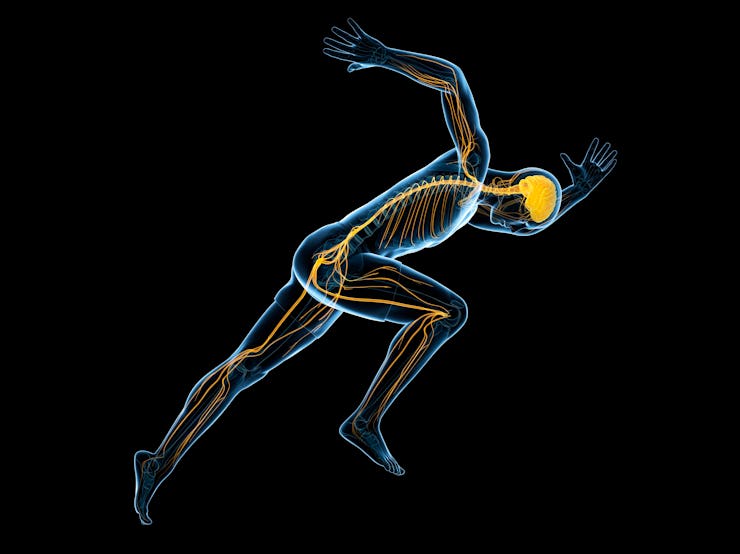One type of exercise has 6 brain boosting effects
"Exercise makes you happy and focused."

In the arsenal of health-promoting behaviors, regular exercise is one of the best tools at our disposal to prevent disease and live a long life. It strengthens immune function, builds muscle, and protects mental health. And according to a recent research review, working out can also make you smarter.
After analyzing 13 studies on exercise and cognitive function, scientists found moderate to high intensity aerobic exercise improved young adults' attention, concentration, as well as learning and memory functions, for up to two hours after working out.
"Exercise makes you happy and focused," study co-author and physician Peter Blomstrand of County Hospital Ryhov and Jönköping University, tells Inverse. "Exercise makes you smart!"
Brain training — Past studies link regular exercise and improved cognitive function in children, teenagers, and the elderly. But few studies focus on young adults or individuals between 18 and 35 years of age, the researchers write.
To fill the research gap and determine the effects of a single workout on young adults' learning and memory function, researchers collated relevant studies published between 2009 to 2019. The team included those studies that use an experimental study design (such as a randomized, controlled trial of an exercise intervention) and included healthy, young adults.
In each study, participants either rested or did physical aerobic exercise. This included cycling, walking, or running. The participants also completed neuropsychological tests of learning, memory, and cognition.
In total, 13 studies were included in the review, which was published September 10 in the journalTranslational Sports Medicine.
In the studies, exercise at moderate to high intensity had a range of positive cognitive effects:
- improved learning memory,
- planning and problem-solving
- concentration-related cognitive functions
- long-term memory
- working memory
- verbal fluency
"I was surprised that all 13 studies showed similar results — that exercise improves learning and memory functions but this knowledge is not so well known and widespread," Blomstrand says.
These effects remained for at least 30 minutes and up to two hours post workout.
Aerobic exercise didn't affect spatial memory, object recognition, or passive avoidance learning.
"Aerobic exercise improves the learning ability and storage in memory when exercise is performed before and in close connection with the learning activity," Blomstrand and colleagues write in the review. The team saw fewer positive effects when participants worked out after completing learning activities, however.
The findings suggest even a single, relatively quick session of exercise can have meaningful effects on the mind.
Over the long term, people who regularly exercise also have improved cognition and increased ability to solve problems, Blomstrand adds.
Researchers suspect exercise activates the brain's frontal cortex, increases neuroplasticity, ups blood flow, and modulates the release of dopamine — factors that appear to induce positive brain benefits.
But more research is needed to pin down exactly how much exercise, and when, gives the brain a boost.
For now, Blomstrand suggests doing daily aerobic exercise or a few times each week. The team excluded strength training and weightlifting from the review, but other studies show these type of exercises also cause positive changes to the brain.
"We can use exercise as a method to improve our cognition but also mental health," Blomstrand says.
LONGEVITY HACKS is a regular series from Inverse on the science-backed strategies to live better, healthier, and longer without medicine.
HOW THIS AFFECTS LONGEVITY — Researchers find that aerobic exercise for two minutes to one hour at moderate to high intensity improved attention, concentration, and learning and memory functions of young adults for up to two hours.
WHY IT'S A HACK — On top of its robust physical benefits, exercise keeps the brain healthy, too.
SCIENCE IN ACTION — Scientists haven't determined an exact exercise regimen for brain health, but suggest walking, running, or cycling a few times a week to see positive cognitive benefits.
HACK SCORE OUT OF 10 — 🚵🏽♀️🚵🏽♀️🚵🏽♀️🚵🏽♀️4/10 sweaty cyclists
Abstract:
Background: Physical exercise improves mental health and cognitive function. The purpose of this systematic review was to evaluate the current literature examining the acute effects of a single exercise workout on learning and memory functions in young adults.
Methods: The review was conducted in alignment with the PRISMA guidelines. Studies were included if they were indexed in PubMed, published between 2009 and 2019, used an experimental study design and conducted on young human adults. The MeSH terms “exercise,” “learning,” and “young adults” were used together with the filters Publication dates—10 years; Human Species; and Article types—Clinical Trial.
Results: Thirteen studies met the inclusion criteria and were evaluated. The types of exercise stimulus that were used was walking, running, or bicycling. Several different test instruments were used such as Rey Auditory Verbal Learning Test, Trail Making Test A and B, and Stroop Color Word Test. Exercise for two minutes to one hour at moderate to high intensity had a favorable effect on learning and memory functions in the selected studies.
Conclusions: This systematic review shows that aerobic, physical exercise before encoding improves learning and memory functions in young adults.
This article was originally published on